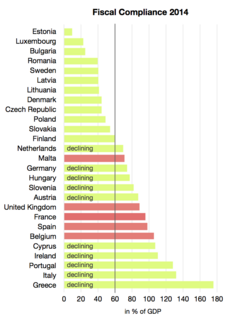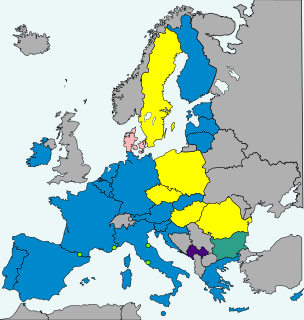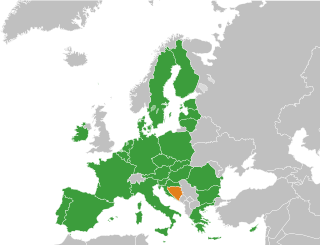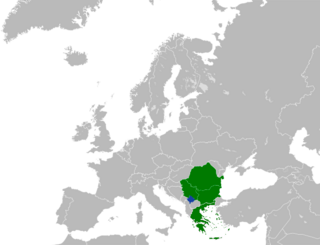Related Research Articles
The implementation of the Dayton Accords of 1995 has focused the efforts of policymakers in Bosnia and Herzegovina, as well as the international community, on regional stabilization in the countries-successors of the former Yugoslavia. Relations with its neighbors of Croatia, Montenegro and Serbia have been fairly stable since the signing of the Dayton Agreement in 1995.

The economy of Bulgaria functions on the principles of the free market, having a large private sector and a smaller public one. Bulgaria is an industrialised upper-middle-income country according to the World Bank, and is a member of the European Union (EU), the World Trade Organization (WTO), the Organization for Security and Co-operation in Europe (OSCE) and the Organization of the Black Sea Economic Cooperation (BSEC). The Bulgarian economy has experienced significant growth (416%), starting from $13.15 billion and reaching estimated gross domestic product (GDP) of $67.9 billion or $171.185 billion, GDP per capita of $24,595, average gross monthly salary of 1,543 leva, and net average monthly salary of $1,644 (2021). The national currency is the lev, pegged to the euro at a rate of 1.95583 leva for 1 euro. The lev is the strongest and most stable currency in Eastern Europe.

Euroscepticism, also spelled as Euroskepticism or EU-scepticism, means criticism of the European Union (EU) and European integration. It ranges from those who oppose some EU institutions and policies, and seek reform, to those who oppose EU membership and see the EU as unreformable. The opposite of Euroscepticism is known as pro-Europeanism, or European Unionism.

The economy of Slovenia is developed and the country enjoys a high level of prosperity and stability as well as above-average GDP per capita by purchasing power parity at 83% of the EU28 average in 2015. Nominal GDP in 2018 is 42.534 billion EUR, nominal GDP per capita (GDP/pc) in 2018 is EUR 21,267. The highest GDP/pc is in central Slovenia, where the capital city Ljubljana is located. It is part of the Western Slovenia statistical region, which has a higher GDP/pc than eastern Slovenia.

The economy of Albania went through a process of transition from a centralized economy to a market-based economy on the principles of the free market. Albania is an upper-middle-income country and a member of the North Atlantic Treaty Organisation (NATO), the World Trade Organization (WTO), the Organization for Security and Co-operation in Europe (OSCE), and the Organization of the Black Sea Economic Cooperation (BSEC).

Pro-Europeanism, sometimes called European Unionism, is a political position that favours European integration and membership of the European Union (EU).

The Stability and Growth Pact (SGP) is an agreement, among the 27 member states of the European Union, to facilitate and maintain the stability of the Economic and Monetary Union (EMU). Based primarily on Articles 121 and 126 of the Treaty on the Functioning of the European Union, it consists of fiscal monitoring of members by the European Commission and the Council of Ministers, and the issuing of a yearly recommendation for policy actions to ensure a full compliance with the SGP also in the medium-term. If a Member State breaches the SGP's outlined maximum limit for government deficit and debt, the surveillance and request for corrective action will intensify through the declaration of an Excessive Deficit Procedure (EDP); and if these corrective actions continue to remain absent after multiple warnings, the Member State can ultimately be issued economic sanctions. The pact was outlined by a resolution and two council regulations in July 1997. The first regulation "on the strengthening of the surveillance of budgetary positions and the surveillance and coordination of economic policies", known as the "preventive arm", entered into force 1 July 1998. The second regulation "on speeding up and clarifying the implementation of the excessive deficit procedure", known as the "dissuasive arm", entered into force 1 January 1999.

The Energy Community, also referred to in the past as the Energy Community of South East Europe, is an international organisation established between the European Union (EU) and a number of third countries to extend the EU internal energy market to Southeast Europe and beyond. With their signatures, the Contracting Parties commit themselves to implement the relevant EU energy acquis communautaire, to develop an adequate regulatory framework and to liberalise their energy markets in line with the acquis under the Treaty.

Bulgaria committed to switching its currency, the lev, to the euro upon its joining the European Union in 2007, as stated in its EU accession treaty. The transition will occur once the country meets all the euro convergence criteria; it currently meets four of the five criteria, the exception being its membership for at least two years of the EU's official exchange rate mechanism. Bulgarian euro coins have not yet been designed, but their motif has been chosen to be the Madara Rider. Bulgaria officially joined the ERM II on 10 July 2020. Bulgarian government and central bank officials adopted a draft national plan for euro adoption on 30 June 2021. They stated earlier that day Bulgaria's intention to adopt the euro on 1 January 2024.

Government procurement or public procurement is the procurement of goods, services and works on behalf of a public authority, such as a government agency. Amounting to 12 percent of global GDP in 2018, government procurement accounts for a substantial part of the global economy.

The accession of Bosnia and Herzegovina to the European Union is the stated aim of the present relations between the two entities. Bosnia and Herzegovina has been recognised by the EU as a "potential candidate country" for accession since the decision of the European Council in Thessaloniki in 2003 and is on the current agenda for future enlargement of the EU. Bosnia and Herzegovina takes part in the Stabilisation and Association Process and trade relations are regulated by an Interim Agreement.

The enlargement of the eurozone is an ongoing process within the European Union (EU). All member states of the European Union, except Denmark which negotiated an opt-out from the provisions, are obliged to adopt the euro as their sole currency once they meet the criteria, which include: complying with the debt and deficit criteria outlined by the Stability and Growth Pact, keeping inflation and long-term governmental interest rates below certain reference values, stabilising their currency's exchange rate versus the euro by participating in the European Exchange Rate Mechanism, and ensuring that their national laws comply with the ECB statute, ESCB statute and articles 130+131 of the Treaty on the Functioning of the European Union. The obligation for EU member states to adopt the euro was first outlined by article 109.1j of the Maastricht Treaty of 1992, which became binding on all new member states by the terms of their treaties of accession.

The Schengen Area is an area comprising 26 European countries that have officially abolished all passport and all other types of border control at their mutual borders. The area mostly functions as a single jurisdiction for international travel purposes, with a common visa policy. The area is named after the 1985 Schengen Agreement signed in Schengen, Luxembourg.

The accession of North Macedonia to the European Union (EU) has been on the current agenda for future enlargement of the EU since 2005, when it became a candidate for accession. Macedonia submitted its membership application in 2004, thirteen years after its independence from Yugoslavia. It is one of five current EU candidate countries, together with Albania, Montenegro, Serbia, and Turkey.

The Treaty on Stability, Coordination and Governance in the Economic and Monetary Union; also referred to as TSCG, or more plainly the Fiscal Stability Treaty is an intergovernmental treaty introduced as a new stricter version of the Stability and Growth Pact, signed on 2 March 2012 by all member states of the European Union (EU), except the Czech Republic and the United Kingdom. The treaty entered into force on 1 January 2013 for the 16 states which completed ratification prior to this date. As of 3 April 2019, it had been ratified and entered into force for all 25 signatories plus Croatia, which acceded to the EU in July 2013, and the Czech Republic.

Croatia's currency, the kuna, has used the euro as its main reference since its creation in 1994, and a long-held policy of the Croatian National Bank has been to keep the kuna's exchange rate with the euro within a relatively stable range.

Andrej Plenković is a Croatian politician serving as Prime Minister of Croatia since 2016. He was previously one of eleven Croatian members of the European Parliament, serving from Croatia's accession to the European Union in 2013 until his resignation as MEP when he took office as prime minister. Plenković has also been president of the Croatian Democratic Union since 2016.
The banking union of the European Union is the transfer of responsibility for banking policy from the national to the EU level in several EU member states, initiated in 2012 as a response to the Eurozone crisis. The motivation for banking union was the fragility of numerous banks in the Eurozone, and the identification of vicious circle between credit conditions for these banks and the sovereign credit of their respective home countries. In several countries, private debts arising from a property bubble were transferred to sovereign debt as a result of banking system bailouts and government responses to slowing economies post-bubble. Conversely, weakness in sovereign credit resulted in deterioration of the balance sheet position of the banking sector, not least because of high domestic sovereign exposures of the banks.

The Craiova Group (Quadrilateral), Craiova Four, or C4 is a cooperation project of four European states – Romania, Bulgaria, Greece and Serbia – for the purposes of furthering their European integration as well as economic, transport and energy cooperation with one another. The Group originated in a summit meeting of the heads of governments of Bulgaria, Romania and Serbia, held on 24 April 2015 in the Romanian city of Craiova. At the group's inaugural meeting, Romania's then-Prime Minister Victor Ponta indicated that he was inspired by the Visegrád Group. Romania and Bulgaria both joined the European Union on 1 January 2007, while Serbia has been in accession negotiations since January 2014. Since October 2017 at the meeting in Varna, Bulgaria, with the inclusion of Greece, meetings have been quadrilateral.

Croatia joined the World Bank in 1993, two years after declaring independence from the Socialist Federal Republic of Yugoslavia in 1991. The World Bank's projects from the mid-1990s to the mid-2000s primarily focused on infrastructural and environmental projects.
References
- ↑ Hauptman, Manica (7 June 2018). "Importance of public investment for economic growth in the European Union". Public Sector Economics. 42 (2): 131–137. doi: 10.3326/pse.42.2.6 . ISSN 2459-8860.
- 1 2 Dombrovskis, Valdis (17 June 2015). On the Commission's new Structural Reform Support Service (Speech). Retrieved 17 July 2020.
- ↑ Turner, Zeke (23 October 2015). "(Greek) Mission: Impossible". Politico. Retrieved 17 June 2020.
- 1 2 Weise, Zia; Holehouse, Matthew (21 March 2016). "Europe shuts door, but still the boats arrive" . Daily Telegraph. ProQuest 1774453645 . Retrieved 17 July 2020– via ProQuest.
- ↑ Tauber, Andre (18 September 2015). "Eine wundersame Wandlung vom Euro-Schreck zum Heilsbringer" [A miraculous transformation from Euro-scare to salvation]. DIE WELT (in German). Retrieved 18 July 2020.
- ↑ Henley, Jon (18 September 2015). "Eurozone's enforcer ready to keep Greece's new leader in line". The Guardian. ISSN 0261-3077 . Retrieved 18 July 2020.
- ↑ "Structural Reform Support". European Commission - European Commission. Retrieved 18 July 2020.
- ↑ Christou, Jean (16 December 2015). "Health ministry ends cooperation with WHO". Cyprus Mail. Nicosia. Retrieved 18 June 2020.
- ↑ Donnelly, Katherine (7 July 2018). "EU joins debate on education". The Irish Independent. Dublin. Retrieved 17 June 2020.
- ↑ Barnes, Dan (1 April 2019). "Estonia builds its fintech muscle" . The Banker. Retrieved 17 July 2020.
- ↑ Šulc, Ajda; Bučar Ručman, Aleš (5 October 2019). "Šola in medvrstniško nasilje v Sloveniji: raziskovalni pristopi, metode in metaanaliza dosedanjega raziskovanja v Sloveniji" (PDF). Šolsko Polje (in Slovak) (1–2): 63–88. doi: 10.32320/1581-6044.30(1-2)63-88 .
- ↑ "Bulgaria economy: ERM II in sight" . ViewsWire. The Economist Intelligence Unit. 31 October 2018. ProQuest 2127488932 . Retrieved 18 July 2020– via ProQuest.
- ↑ "Ex post evaluation of regulation in Croatia". Regulatory Policy in Croatia Implementation is Key. OECD Reviews of Regulatory Reform. Paris: Organisation for Economic Co-operation and Development. 18 June 2019. doi:10.1787/b1c44413-en. ISBN 978-92-64-68206-1. OCLC 1154139049. S2CID 241726221 . Retrieved 18 July 2020.